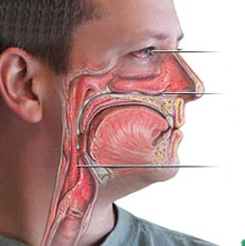Resources
An abundance of clinical experience and scientific data has been assembled on the practice of acupuncture over the years, demonstrating to the wide range of diseases and conditions that can be effectively treated with this approach. Unlike many other traditional methods of treatment, which tend to be specific to their national or cultural context, acupuncture has been used throughout the world. The past fifty years have seen extensive studies on acupuncture, and great efforts have been made to conduct controlled clinical trials. Although still limited in number because of the difficulties of carrying out such trials, convincing reports, based on sound research methodology, have been published. In addition, experimental investigations on the mechanism of acupuncture have been carried out. This research, while aimed chiefly at answering how acupuncture works, also provide evidence in support of its effectiveness.
What Causes Allergies?

To put it simply, allergies are caused by allergens. Allergens can be almost anything, from pet dander to pollen to food items, and while it’s tempting to blame them for our symptoms, the truth is that it’s really our immune systems that give rise to the characteristic allergy symptoms. Though it might’ve encountered a harmless speck of pollen a million times before, suddenly, your immune system may decide to overreact one day, triggering an allergic reaction.
What Makes Some Pollen Cause Allergies and Not Others?
It really comes down to a pollen’s preferred mode of transportation. Some pollens, like pollens from our backyard vegetable and flower gardens, are carried by pollinators like honeybees. This pollen is heavier, and there’s less of it to go around. This pollen sits and waits for an insect to come along to do its pollination for it. Other plants, like trees and many weeds like ragweed, generate massive amounts of lightweight pollen, and they rely on the wind for pollination. This airborne pollen is most likely to be inhaled by humans, and most likely to cause allergies.
What is the Role of Heredity in Allergy?
There are three factors that impact an individual’s allergic outlook. The first one is genetic—are your parents allergic to specific things, and did you get the same genes? Second, have you been exposed to allergens? You can’t be allergic to something you’ve never encountered. If your mom is deathly allergic to beets, but you’re growing up in India, your potential for developing a beet allergy isn’t likely to be realized, because beets aren’t common in that country. The third factor is length of exposure, and degree to which you are exposed. One strawberry is not likely to trigger a lifelong allergic response, but bingeing on them might.
Diagnosing

Typically, allergies are diagnosed in three steps. First, your doctor will take a thorough medical history. This may reveal clues to what is causing your allergic reaction. Second, a physical exam, with special attention paid to your ears, eyes, nose, throat, and chest will cover any allergy symptoms that are presenting themselves. Following the exam, your doctor may perform a few tests to get a complete picture of your allergic profile. These tests may include prick/scratch skin testing, patch testing, or blood tests.
Treating for Allergies

When you’ve been diagnosed with allergies, the biggest thing to keep in mind, moving forward, is avoiding those allergens that trigger a response. Sometimes this isn’t always possible, as with tree pollens.
While traditional medicines can be effective, alternative therapies such as immunotherapy, and acupuncture can be helpful. In TCM, strengthening the immune system after an seasonal allergen is identified isn’t as effective as treating during the prior season.
Prevention

As we discussed before, sometimes the best thing you can do is try to avoid contact with allergens that trigger a response. At home, this involves keeping a clean, tidy house: vacuuming and dusting frequently, washing bedding regularly to prevent pollen from building up in the sheets, and changing your furnace’s filter to trap air contaminants. If you have a pollen allergy, avoid going outside during the warmest, driest part of day, typically 10am-4pm, when pollen counts are highest. When you’re in the car, keep your car windows closed, as well. And of course, if you’ve got a food allergy, or are allergic to pet dander, do what you can to avoid contact with those triggers.
Causes of Infertility

Fertility problems can be incredibly frustrating. Often, problems can be foreseen: they simply show up when a couple is trying to conceive, posing questions that are difficult to answer and wasting valuable time. Further complicating things, there are a wide range of treatments available, and it can be confusing to decide which one to try first.
Fertility issues for both men and women have a variety of causes, including hormonal problems, long-term use of birth control medication, physical damage such as scarring to reproductive organs, and, in women, “unruptured follicle syndrome,” which prevents ovulation from happening. What many of these disorders have in common is imbalance: hormones that are either too low or too high; organs not working optimally; bodily systems that fail to function. Acupuncture can work to treat these problems by realigning the body’s energy and clearing blockages.
Diagnosing Infertility

Diagnosing fertility problems, especially for women, can require expensive, often uncomfortable procedures. These range from basic blood tests to measure hormone levels at ovulation to hystrosalpingography, which involves injecting X-ray contrast into the uterus and then taking X-rays to obtain a clear picture of the cavity. Since many fertility problems are hormonal, tracking hormone levels is often where testing begins.
For men, fertility testing usually begins with semen analysis to ensure sperm are healthy and that sperm count is at normal levels. Other tests are more involved, including blood testing for hormone levels, transrectal and scrotal ultra sound to look for ejaculatory duct obstructions, and testicular biopsy to assess whether sperm production is normal.
Sometimes, fertility problems will have no logical explanation. Sometimes, an adjustment in stress, diet, sleep patterns, or intercourse habits is needed to resolve the issue. Ray Chernly Acupuncture can help recommend a comprehensive treatment plan in these cases.
Fertility

Achieving or maintaining optimal fertility may be as simple as making a few lifestyle changes. Poor diet, excessive consumption of caffeine or alcohol, and illegal drug use can all have a huge impact on fertility for both men and women. Stress can lower hormone levels and even cause a woman’s cycle to pause in extreme cases. For men, stress can also be a factor, as can lifestyle choices and even attire. Tight clothing has been shown to adversely affect sperm count.
In many cases, prioritizing health and self-care is a great first step towards boosting fertility. Acupuncture serves as an extension of that, realigning the body’s energies and ensuring nothing gets between you and your journey towards conception.
Prevention

Preventing fertility problems can be tricky, especially when the cause of the fertility problem is unknown. Prior health problems may have caused damage to the reproductive organs, making conception difficult. In many cases, however, fertility challenges are caused by hormone levels that are too low or too high. When this happens, fertilization can be difficult or even impossible, so it’s important to be aware of how your daily life can affect these hormones. Often, making positive changes to diet, sleep patterns, stress levels, or boosting physical exercise can serve to straighten out hormone levels. Similarly, acupuncture treatments have been shown to help both men and women overcome fertility problems by clearing blockages in the body’s energy pathways and realigning Qi.
Anyone Can Be Affected

Pain doesn’t discriminate. Whether it’s the acute pain of a twisted ankle, or the pulsing, chronic pain of arthritis, anyone can find themselves suddenly beset by enough pain to substantially impact their quality of life. Millions of people suffer from chronic pain or pain conditions that recur many times (like headaches, or severe menstrual pain), and cumulatively, this pain has a tremendous effect on our happiness, our productivity—even our GDP!
Arthritis is another big pain trigger than can often come and go with changing seasons or weather patterns. Pain in joints, as with lower back, neck, and knee pain can be a sign that joint damage has occurred, and can have a significant impact on quality of life. Lastly, pain from cancer—both from chemotherapy treatments and from the disease itself—can never fully disappear, always sitting there in the background, causing discomfort.
Acute vs. Chronic
While acute pain tends to be shorter-lived, chronic pain can have deep underlying causes that conventional medicine may fail to explain or adequately address. The Institute of Medicine of The National Academies estimates that 100 million Americans suffer from chronic pain—more than suffer from diabetes, cancer, and heart disease combined! It’s a serious, ongoing challenge to our health care system, one that is difficult to address.
Chronic pain like that mentioned above can be caused by a variety of conditions. Sometimes, an injury that never fully heals is to blame, as with a sprained back. Some core injuries go so deep that healing can be nearly impossible, and so, the pain lingers on and on. Headaches, though usually relenting after a period of time, are considered chronic pain, because they can recur. Stress and dehydration are often triggers for headache pain. Neurological pain is chronic pain of a very serious type, indicating the presence of nerve damage in the brain. When the nerves are damaged, they send faulty signals to the brain’s pain centers, resulting in very difficult-to-manage pain.
Acute and Chronic

While acute pain is usually treatable with rest and healing, chronic pain often has no cure. Like an unwelcome relative, chronic pain is there at all hours of the day and night, and it never leaves. With this sort of pain, the emphasis should be on finding effective treatments for the pain, and not on finding a cure.
People suffering from chronic pain and chronic recurring pain such as headaches and menstrual pain often seek out acupuncture for relief. In fact, chronic pain is one of the conditions acupuncture is most often used to treat—and most effective against. And it’s so simple! Unlike physical therapy, which can also be effective but takes months or years of work, and pharmaceutical drugs, which can have unpleasant side effects, acupuncture often requires just a few short sessions before improvement is seen. Patients most often seek out acupuncture due to headaches; neck, back, shoulder, and knee pain; and menstrual pain.
Injuries

Injuries, whether as large as an auto accident or as small and insignificant as a paper cut, are what most people think of when they think of pain. Certainly, no one will be seeking treatment for their paper cuts, but for larger, more serious injuries such as sports injuries, broken bones, head trauma, and car accidents, the pain can be acute, and crippling. The deeper the injuries, the longer they take to heal, and, if healed improperly, they can result in ongoing chronic pain for years. The good news is, acupuncture can be very effective here, speeding healing and boosting the recovery process.
Prevention

The prevention of pain should be everyone’s goal in life, right? While preventing an unforeseen injury can be impossible, stopping the onset of chronic pain can be as straightforward as maintaining proper nutrition, exercising regularly, and maintaining healthy joints through stretching. Acupuncture is most effective when used in conjunction with good health practices, and so, Ray Chernly Acupuncture can help set up a holistic wellness program tailored to your individual needs.


